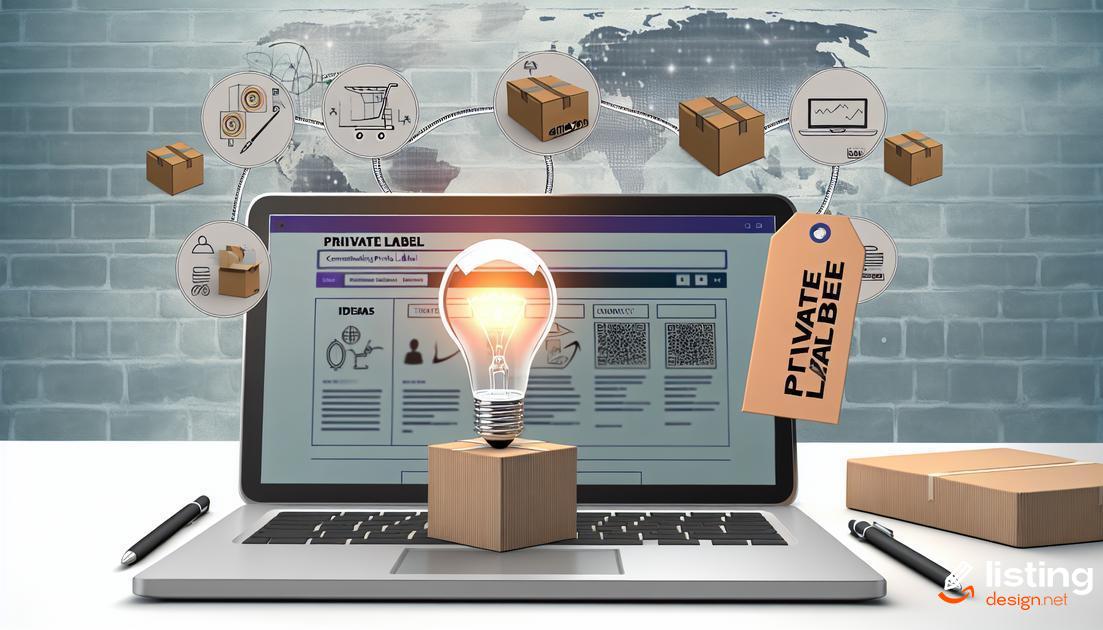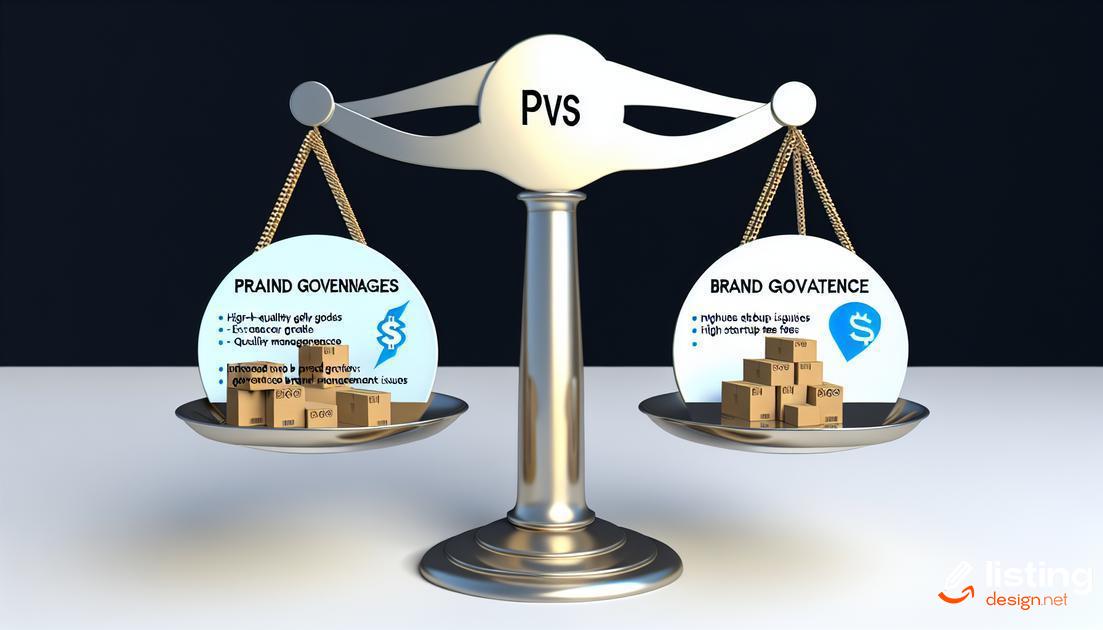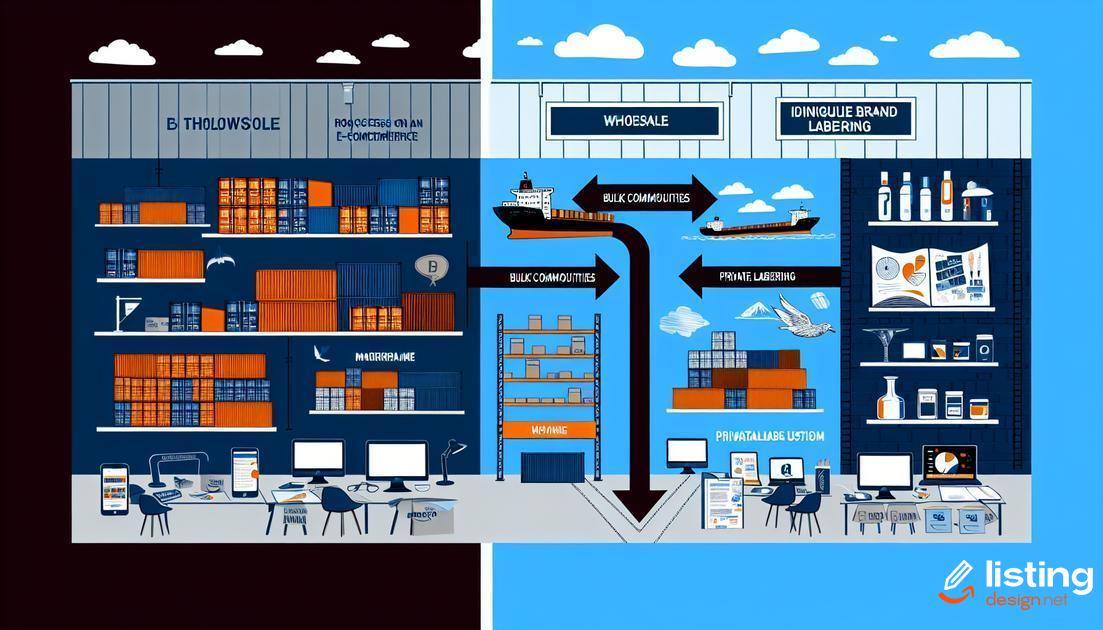If you’re considering entering the Amazon marketplace, you’ve likely come across two popular business models: wholesale and private label. In this article, we’ll delve into the differences, benefits, and drawbacks of each approach. Understanding wholesale vs private label on Amazon is crucial for making an informed decision that aligns with your goals and resources.
Table of Contents
Understanding Wholesale on Amazon
When it comes to wholesale on Amazon, you deal with established brands. Essentially, you buy products in bulk directly from manufacturers or authorized distributors. Buying in bulk typically means lower per-unit costs. You then sell these products on Amazon at a markup to make a profit.
Inventory management can be relatively straightforward since you’re selling brands that consumers already recognize and trust. The primary tasks are ensuring consistent supply and monitoring product performance. Your primary focus will be on logistics and price competition rather than brand building. This can let you start earning money faster but it often means slimmer margins.
Typically, you won’t have to deal with product development. The products are already designed, tested, and branded. Your job is primarily to source them at the best price and market them effectively on Amazon. However, this also means you have less control over the product itself and the brand’s overall image. The manufacturer can change product specs or stop production, impacting your business.
Records and invoicing prove your relationship with authorized distributors, which is essential for overcoming potential Amazon’s brand gating. Some categories and brands need approval which can be a hurdle but once cleared, it adds a layer of trust in the marketplace. Overall, managing a wholesale business model on Amazon requires a balance between efficient inventory management and competitive pricing strategies.
Understanding Private Label on Amazon

Private labeling on Amazon involves creating your own brand and applying it to products manufactured by a third party. This allows sellers to differentiate themselves with unique branding. Unlike wholesale, where you sell products under the manufacturer’s brand, private label products bear your own brand name.
Benefits of Private Labeling:
- Higher profit margins: Private labeling allows you to set your own price, typically resulting in higher margins compared to selling wholesale products.
- Brand recognition: Building your own brand can lead to increased customer loyalty and recognition.
- Exclusive listings: With private label, you won’t compete with others selling the same product, enabling you to control the product listing entirely.
However, private labeling also comes with challenges. It requires a significant initial investment in product development, branding, and marketing. Quality control is critical as any issues with your branded products directly impact your reputation. Additionally, you’ll need to invest time in creating attractive packaging and marketing materials to stand out in the competitive Amazon marketplace.
Pros and Cons of Wholesale
Pros:
-
Lower Initial Investment
Wholesale typically requires less capital upfront because you buy products in bulk from manufacturers or distributors.
-
Faster Time to Market
Since the products are already manufactured and branded, you can list and sell them on Amazon quickly.
-
Product Reliability
Wholesalers often deal with established and reputable brands, ensuring product quality and reliability.
Cons:
-
Lower Profit Margins
Reselling brand-name products usually results in lower profit margins compared to private label products.
-
High Competition
Due to the accessibility of wholesale, many sellers may offer the same products, increasing competition on pricing and visibility.
-
Limited Control
There is less room for product differentiation and customization since you are reselling existing products.
Pros and Cons of Private Label

Pros of Private Label
Private labeling allows you to create a unique brand that stands out in the Amazon marketplace. You have full control over your product’s branding, packaging, and pricing. This level of customization helps in building customer loyalty and a strong brand identity. Additionally, private label products can often yield higher profit margins compared to wholesale, as you aren’t competing directly with other sellers offering the exact same product. This also means you have exclusive rights to sell your branded product, reducing the likelihood of price wars.
Cons of Private Label
On the downside, private labeling requires a significant initial investment. You need capital for product development, manufacturing, and marketing. This can be risky if the product doesn’t perform well in the market. There’s also a longer lead time associated with creating and launching a private label product compared to a wholesale model. Furthermore, managing a private label brand involves more responsibilities, including quality control, inventory management, and brand promotion, which can be time-consuming and might require a dedicated team or hiring experts.
Cost Implications of Each Model
When considering the cost implications of wholesale versus private label on Amazon, it’s crucial to understand the different financial demands each model entails. Wholesale often requires a higher initial investment due to the necessity of buying products in bulk from suppliers. This can be a substantial lump sum, especially if the chosen products are high-value items. On the other hand, the ongoing costs, such as storage and shipping from fulfillment centers, can be more predictable, allowing for easier budgeting.
For private label, the
initial expenses
may involve lower quantities, but they entail additional costs such as branding, packaging, and possibly higher per-unit manufacturing costs in smaller batches. Moreover, significant investment in marketing and advertising is often required to build the brand’s visibility and reputation on Amazon’s competitive platform.
Profit margins
also vary between the two models. Wholesale margins can be slimmer, as the products are often sourced from popular brands with pre-established market prices. With private label, you have more control over pricing, potentially leading to higher profit margins if your product meets market demand and secures good placement on the platform.
Another cost factor to consider is the risk associated with unsold inventory. Wholesale products might move faster due to brand recognition, but unsold private label products can occupy warehouse space and tie up capital. Strategic planning and market research are essential to mitigate these risks for both business models.
Finally,
reinvestment
is vital in both scenarios. Whether reordering stock for a wholesale business or funding new product development and marketing for private label, continuous financial input is necessary to sustain and grow the business.
Time Investment and Management

Understanding the Time Investment and Management
Managing your time effectively when choosing between wholesale and private label is crucial. In wholesale, the initial time investment might seem lower, as you’re sourcing already established products. You will need to find reliable suppliers, negotiate prices, and handle logistics. However, ongoing time commitments can become significant due to the need for constant stock monitoring and relationship management with suppliers.
When dealing with private label, the time investment initially is much higher. This involves product research, designing, branding, and selecting manufacturers. Creating a unique product from scratch demands thorough market research and can take months before your product hits the market. Nevertheless, once the setup is complete, the time required for maintenance might be less compared to wholesale, as you have full control over your branding and inventory.
Effective time management strategies include automating parts of the process with software tools for inventory management and employing virtual assistants to handle routine tasks. Understanding these elements can help you make a more informed decision based on your ability to invest and manage your time efficiently.
Scalability and Growth Potential
Scalability and Growth Potential
When analyzing the potential for scalability and growth in wholesale versus private label on Amazon, there are distinct differences to consider. In the wholesale model, scalability is often achieved by expanding the range of products you carry from various established brands. This means you are not putting all your eggs in one basket, as you can diversify your inventory based on market demand.
However, the growth potential in the wholesale model can be limited by the availability of products from suppliers and the competitive landscape. Since you are competing with other sellers who may have access to the same products, it can be challenging to stand out without engaging in price wars, which can erode profit margins.
On the other hand, private label offers significant growth opportunities as you have the advantage of creating your own brand. This uniqueness allows you to control pricing, brand identity, and customer loyalty. With private label, you can scale by improving product variations, enhancing marketing strategies, and expanding your product line without the same level of competition seen in the wholesale space.
Nonetheless, scaling a private label brand requires substantial investment in marketing, product development, and quality control. Establishing a reputable brand takes time and effort, but once established, it can lead to higher profit margins and customer retention.
Which Model is Right for You?

Deciding between wholesale and private label on Amazon depends on various factors. You need to consider your business goals, budget, and desired level of control. For those looking for a quicker start with less initial effort, wholesale might be the better option. This model involves sourcing products in bulk from established brands and reselling them.
Meanwhile, private label
offers greater control over product branding and customization, allowing you to build a unique identity. It does, however, require more time for product development and marketing. Evaluate your ability to manage inventory, your risk tolerance, and your long-term vision to determine the model that aligns best with your objectives. Consider the strength and weaknesses of each approach to make an informed decision.


